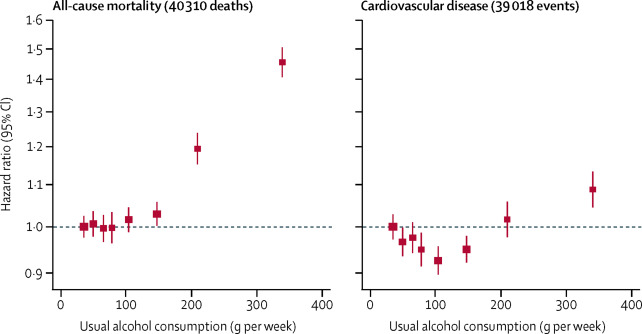As with many things, it seems to depend what you look at in the study. It appears almost any amount of alcohol increases cancer risk marginally. But there are beneficial effects found in other studies. I'm hoping soon someone will do a meta-study, to pull all this data together.
Potential problems with study
The Journal and the Authors Hyped this Study
The study's findings were not terribly remarkable. In fact, there is reason to be skeptical of them.
Problem #1. The study did not properly adjust for all
confounders. A confounder is any factor that is associated with both the exposure (in this case, alcohol) and the outcome (in this case, various types of cardiovascular disease and death). One of the most famous examples of confounding occurred when a study concluded that coffee caused pancreatic cancer. The authors did not adjust for smoking, which was associated with both drinking coffee and pancreatic cancer. As it turned out, coffee drinkers were also likelier to smoke, and it was the smoking that killed people, not the coffee.
In this alcohol study, the authors adjusted for age, sex, smoking, and diabetes. That's good, but it's not sufficient. There are other confounding factors that are associated with drinking and cardiovascular disease or death, such as profession, socioeconomic status, race/ethnicity, diet, and exercise frequency. It is entirely plausible that people who drink every day also have other lifestyle factors that are associated with cardiovascular disease, such as a poor diet or lack of exercise. Maybe heavy drinkers have stressful jobs.
The point is that the alcohol may not be to blame.
However, we can't determine this from the study because the authors didn't even bother to collect data on it.
Problem #2. People who drank 100 grams of alcohol per week had a
lower risk of all cardiovascular diseases. It's only when cardiovascular disease (CVD) is broken down into various subtypes that the data show higher risk for one type of CVD and lower risk for another type of CVD. For example, the risk of stroke increases, but the risk of myocardial infarction (heart attack) decreases.
Overall, people who drank 100 grams of alcohol per week did not have a higher risk of death. It's not until a person consumes two drinks per day (~200 grams per week) that the data suggest an impact on mortality. (See figure.)
That means that the authors purposefully highlighted the scary data (i.e., each additional 100 grams of alcohol increases some types of CVD) and downplayed the bigger picture -- namely, that 100 grams of alcohol isn't dangerous. Why? The authors have a specific mission in mind, and they admit it in their paper: "These data support limits for alcohol consumption that are lower than those recommended in most current guidelines."
Problem #3. Scientific studies need to make sense within the context of what else is known about the topic.
Europeans drink more alcohol than Americans, yet they (Western Europeans, anyway) have longer life expectancies. How do the authors explain that?
Problem #4. Because the authors didn't find any damning data for people who consume 100 grams of alcohol per week (again, that is roughly one drink per day), they shifted their focus to people who drank more than that. They concluded that people who drank 200 grams per week (about two drinks per day) had a shorter life expectancy of six months. Not only is this finding subject to the same confounding problems mentioned earlier, it's not a clinically meaningful result. If a person expects to live to be 85 and instead dies at age 84.5, who cares?
The only clinically meaningful data was for people who had roughly 2 to 3.5 drinks per day or roughly 3.5+ drinks per day. Those groups had shorter life expectancies by 1-2 years and 4-5 years, respectively. Of course, that's not a surprise. These people are alcoholics.
Problem #5. The Guardian's coverage was particularly atrocious. They quoted one professor (not associated with the study) who said, "This study makes clear that on balance there are no health benefits from drinking alcohol." That's not at all what the study showed. In fact, it showed the opposite: 100 grams of alcohol per week was linked to less overall cardiovascular disease.
Problem #6. I e-mailed the lead author, asking about many of the problems I cited above. She did not respond. I will be charitable and assume it's because she was too busy to respond, but she wasn't too busy to respond to either the BBC or
The Guardian, both of which sensationalized the study. That makes me think that this media frenzy was precisely what the authors wanted.
Problem #7. The Lancet also ran an
editorial that said, "The drinking levels recommended in this study will no doubt be described as implausible and impracticable by the alcohol industry." The implication is clear: Anyone who disagrees with the paper is a paid shill for Big Alcohol. That's not science; that's propaganda.

